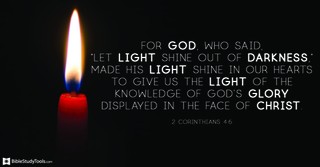
- Recent Translations
- All Translations
Kehillah in Corinth II 4:3
Share
Settings
Kehillah in Corinth II 4:3 Meaning and Commentary
But if our Gospel be hid
When the Gospel is called ours, the meaning is, not that ministers are the authors or subject of it; but it is so styled, because they are intrusted with it; it is preached by them; and is in opposition to another Gospel, the Gospel of the false apostles. Here an objection is obviated, which the apostle saw would be made against the clearness and perspicuity of the Gospel, asserted by him in the foregoing chapter; taken from some persons, who though they sat under the ministry of the word, were not enlightened by it, saw no glory nor excellency in it, nor were their minds in the least affected with it: to which he replies, saying, "if our Gospel be hid",
it is hid to them that are lost.
But why should the apostle put an if upon its being hid? is it not hid? is it not "the wisdom of God in a mystery, even the hidden wisdom?" To which may be answered, that it was hid in God from the beginning of the world; and in Christ, in whom are hid all the treasures of wisdom and knowledge; and in the ceremonial law, which contained types and shadows of many things in it; and was hid from whole nations, and for whole ages formerly: but now God has made known the mystery of his will; Christ is manifest in the flesh; the ceremonial law is done away, and the Gospel is preached to Jews and Gentiles; so that it is hid to none, as to the outward ministration of it: and if the internal, spiritual, and saving knowledge and experience of it is hid from any, eventually and finally, it is "to them that are lost": all mankind are in a lost and perishing condition through sin; though some will not be lost eternally, whom God has chosen, Christ has redeemed, and who by the Spirit are brought savingly to believe in Christ; but there are others, that will be lost for ever; and to these the Gospel is hid; and they are such, who are left to the native blindness of their minds, and are given up to a reprobate mind, to judicial darkness, and are suffered to be under the influence of the prince of darkness, as in the following verse; now such instances are no more an objection to the clearness and perspicuity of the Gospel, and the ministration of it, than men born blind, who never could, nor never will see light, are to the bright and clear shining of the sun noon day.
